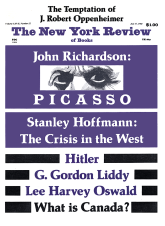In response to:
In Defense of Doctors from the May 15, 1980 issue
To the Editors:
May I comment on a few points in P.B. Medawar’s review of The Role of Medicine [NYR, May 15]?
He quotes accurately the reason for thinking that food supplies increased in Britain, as they did in many other countries, in the eighteenth and early nineteenth centuries: the fact that a greatly expanded population was fed on home grown food. I believe this conclusion is generally accepted. What is in question is whether food consumption per head of population increased, and whether an improvement in nutrition was the main reason for the decline of infectious diseases before the late nineteenth century. I suggested that the grounds for this view are three-fold: this explanation is consistent with present-day experience of the relation between malnutrition and infection; it accounts for the fall of mortality and growth of population in many countries at about the same time (in spite of other marked differences between them); and when extended to include improved hygiene and limitation of numbers, it attributes the decline of the infections to modification of the conditions which led to their predominance.
I know, and have often quoted, Haldane’s suggestion concerning the importance of infectious disease as a selective force. However, latterly I have become doubtful about it. Until about the last ten-thousandth of his existence man’s experience of infectious disease is an open question, for while living as a nomad mainly in tropical and sub-tropical areas he undoubtedly suffered from vectorborne diseases, it is unlikely that infection was the predominant cause of death that it became in the agricultural period. Even in this period, the long term selective effects of heavy mortality from infection are not clear. Scarlet fever, for example, has had three cycles of increasing and decreasing severity. And are there reasons for thinking that there has been any enduring selective influence from the former high mortality from, say, plague, typhus, and gastro-enteritis? I am not overlooking the example of sickle cell anemia. My own guess is that ability to survive on marginal food levels may have been the more important influence. There are many people alive today who suffer from inability to lose weight unless they reduce their food intake to a few hundred calories. Their ancestors must have had a considerable selective advantage.
I agree, and thought I had said fairly clearly (p. 183), that society is unlikely to accept a large reduction in age at first pregnancy, should that prove to be a requirement for prevention of breast cancer. Equally, it would be unwilling to reduce the density of population to a few people per square mile in order to prevent the common cold. Hence such conditions, which are in principle preventable, can be tackled successfully only through knowledge of their mechanisms. However, this is not true of most of the diseases associated with poverty or affluence.
As for admission of the dentists to heaven: they can deal successfully with overcrowding and irregularity of teeth; they can tell us how to prevent most cases of decay; if decay occurs they can do a pretty satisfactory repair; and if we are so foolish or so unfortunate as to lose all our teeth, they can provide an acceptable substitute. Moreover they can offer their remedies painlessly and with few risks. There are not many medical conditions for which one could say as much.
Thomas McKeown
The Medical School
University of Birmingham
Birmingham, England
P.B Medawar replies:
I have not misrepresented Professor McKeown’s opinions so his letter does not call for a detailed reply; it does, however, give me an opportunity to explain again why I deplore the querulous and disaffected air of books such as his and Ivan Illich’s.
Enjoying the two-fold qualification of being a biologist and having suffered two very grave illnesses I am in a stronger position than either to emphasize the importance of a human being’s very strongly marked preference for being alive as opposed to being dead. So long as this preference remains an important element of the human psyche, so long will medical treatment, if necessary of a strenuous and heroic character, remain in demand.
I do however wholeheartedly agree with the adage that “prevention is better than cure” and for his part Professor McKeown would certainly agree that this sentiment does not break new ground.
I myself should rather not have needed medical treatment, but as I did need it, thank God I got it.
This Issue
July 17, 1980



